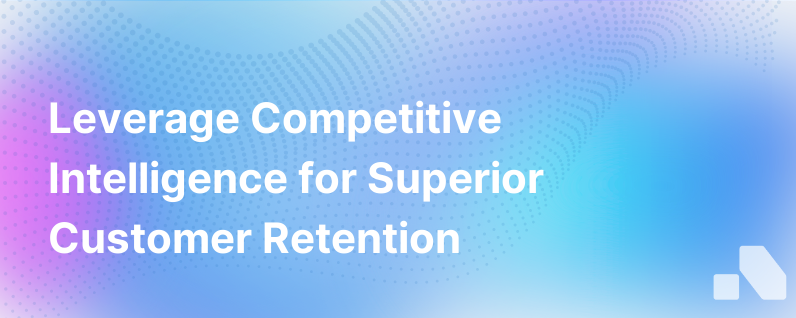
Traditional models of selling focus primarily on customer acquisition, but in today's hyper-competitive B2B sales environment, customer retention is equally critical. Persistent market fluctuation, the proliferation of product offerings, and aggressive pricing schemes from competitors make holding onto customers increasingly challenging.
To retain customers, businesses need to demonstrate ongoing value and build stronger relationships. This is where Customer Retention Competitive Intelligence (CRCI) comes into play, providing competitive insights that help a company to secure customer loyalty.
The Importance of Customer Retention
Brainwork CEO Frederick Reichheld found that increasing customer retention rates by 5% increases profits by between 25% and 95%. The logic is simple: loyal customers are more likely to renew contracts, purchase more, and recommend your product to others, thus increasing your total sales without incurring the cost of acquiring new customers.
But retention isn't just about keeping customers from churning; it's also about becoming a trusted partner in your customer's success. Understanding how your competitors may potentially serve your customers' needs better equips you to pre-emptively offer superior solutions, thereby strengthening your relationship with customers.
Competitive Intelligence for Customer Retention
Competitive intelligence, traditionally associated with gaining market share or launching new products, is now being seen as a critical tool for customer retention. Tracking competitors, understanding their strategies, strengths, and weaknesses, enable businesses to take proactive measures to prevent customer churn.
Here are key aspects of competitive intelligence essential for customer retention:
-
Market Trends: Regularly mapping market landscapes for changes, like shifts in consumer behavior or an emergence of a disruptive new technology, provides invaluable insights to fine-tune your retention strategies.
-
Competitor Offerings: Understanding your competitor’s product or service offerings can highlight potential advantages they may have over you. Armed with such knowledge, you can take steps to adapt your offerings or highlight your own advantages more prominently.
-
Competitor Pricing Strategies: Being aware of your competitors' pricing strategies is vital; if they offer equivalent value at a lower price, customers might be tempted to switch.
-
Brand Perception: Observing your competitors' online presence and customer feedback on various platforms can yield insights into their brand perception, which can be a significant factor in customer loyalty.
How to Leverage Competitive Intelligence for Customer Retention
Identify Your Competitors: Not all competitors pose the same threat. Some may compete on price, others on innovation, and still, others on customer service. Understanding your competitor's value proposition allows you to prepare and respond proactively.
Collect Competitive Intelligence: Use a host of tools and methods available, like website analysis, customer reviews, social media monitoring, buying their products, or simply speaking to customers to learn about competitors' strengths and weaknesses.
Analyze and Interpret Findings: Consider both quantitative and qualitative data from reliable sources. This analysis can uncover trends, strengths and, most importantly, the weaknesses of your competitors.
Implement Strategic Changes: Use the insights obtained from competitive analysis to boost your value proposition. Perhaps you could offer new features, services, or tweak pricing to underscore your differences from competitors.
Monitor Continuously: The process of using Competitive Intelligence for Customer Retention doesn't stop at strategic changes. The market is perpetually dynamic, urging the need for constant monitoring of competitors, market trends, customer mood, and so forth.
The Role of AI Platforms in CRCI
AI platforms like Aomni enhance CRCI processes by providing real-time, actionable insights into customer behavior, competitor trends, and market dynamics. Aomni harnesses predictive intelligence to prevent potential customer churn, understand competitor strategies, and spot market opportunities, thereby enhancing the efficiency and effectiveness of CRCI initiatives.
AI also reduces the labor requirement in managing and analyzing huge volumes of data, considerably bringing down the cost and time involved in CRCI, while enhancing the quality and reliability of insights.
In Conclusion
Customer retention is often more profitable than the acquisition of new customers, making it a crucial part of a company’s strategy.
Using competitive intelligence in the right way can help you retain your customer base by not only meeting their expectations but exceeding them. It allows your business to adapt dynamically and fill gaps before they become visible. Combining your competitive intelligence strategies with automated AI tools like Aomni can help maximize your customer retention efforts.